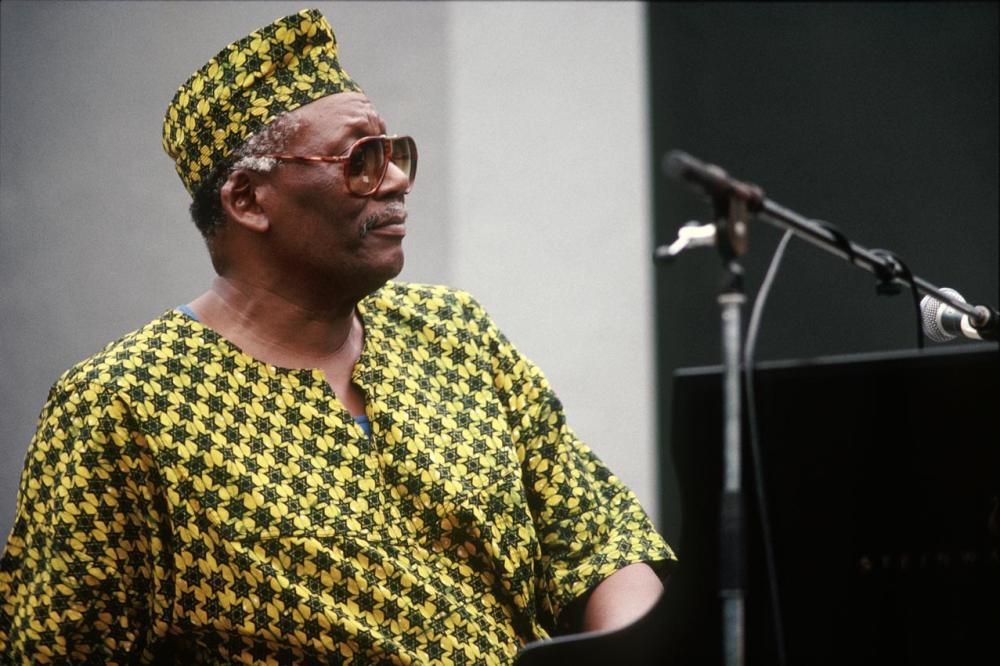Happy 90th Birthday!

Yesterday was the pianist and composer Randy Weston’s 90th birthday. Willard Jenkins, who collaborated with the 6’7″ pianist on his 2010 autobiography, African Rhythms, reported on Facebook that Randy was treated to a surprise birthday party with friends and members of his ensemble. He’s currently on tour, and he was in Washington, D.C., last weekend for the annual National Endowment for the Arts Jazz Masters award ceremony; Randy was honored by the NEA in 2001.

In my tribute to Weston in last night’s Jazz à la Mode, I included five titles from his groundbreaking 1963 album, HIGHLIFE. Randy was born in Brooklyn, where his father, Frank Edward Weston, operated a restaurant that doubled as an informal Bed-Sty community center. The elder Weston inculcated in his son a sense of Africa as his spiritual home, and Randy’s devoted much of his life to exploring and establishing connections with the continent. Weston first toured Nigeria in 1961, and returned to West Africa a few times before settling in Morocco for about five years beginning in 1968. HIGHLIFE celebrates the traditional rhythms of West Africa’s newly independent nations, and the inspiration Weston felt when he visited the Caban Bamboo Club in Lagos. “The music was so inspiring that at one point I jumped up and got the spirit…The music started getting more and more intense and the next thing I knew I could feel myself leave the earth. This music was so powerful I was literally levitating, or so I felt.”
I’ve enjoyed a couple of inspiring encounters of my own with Randy in recent years. In 2011, we were on a panel commemorating the 40th anniversary of the W.E. B. DuBois Department of Afro-American Studies at the University of Massachusetts. There Randy acknowledged the leading role that his lifelong friend Max Roach had made in establishing the African American/Jazz Studies major at UMass in the seventies. Max’s is the first name to appear in Randy’s autobiography, where on page one he writes, “I hung out as an inexperienced, green piano player with the grandmaster drummer Max Roach, one of my Brooklyn homeboys.” He mentions meeting Dizzy Gillespie, Leo Parker, George Russell, and Miles Davis at Max’s Brooklyn home and recalls, “One time I was over at Max’s house and Charlie Parker walked in. I had started writing my own tunes by this time and Max immediately put me on the spot. He said, ‘Randy, play some of your music for Bird.’ I was in total shock…The idea of playing something for Bird put me in total shock. This man was already a legend. But after I finished playing, Bird said, ‘Yeah, yeah, Randy, that was nice.”
Here’s Max and Randy in Spain at the 1999 San Sebastian Jazz Festival playing Thelonious Monk’s “Well, You Needn’t.”
In African Rhythms, Randy describes Monk as “perhaps my biggest influence…When I heard Monk play the piano [with Coleman Hawkins in 1943], I didn’t get him at first, but he eventually opened the door for me, showed me the direction for our music, where we maintain all the traditions of African music and we create from there…When I heard him the second time I felt Monk put the magic back into the music; music became universal for me.”
In 2010, Randy was at the Wadsworth Atheneum to mark the Hartford Jazz Society’s 50th anniversary. He’d been the first artist ever booked by the society, and at a brunch on the day after his concert, he talked about his career. A small gathering of fans peppered him with questions, and when I asked him about the quintet he led with Coleman Hawkins, Kenny Dorham, Wilbur Little, and Roy Haynes at the Five Spot in 1959, he warmed to the memory of the great saxophonist whom he called “my idol.” He said he “tried to play the piano like Coleman Hawkins played the saxophone.” He was especially enthusiastic about the piano introduction that Gene Rodgers had played on Hawk’s classic recording of “Body and Soul.” It’s an often overlooked element of Hawk’s masterpiece, but not to the then 13-year-old pianist. In his autobiography, Weston added, “When he recorded his big hit version of “Body and Soul,” in 1939, I ran out and bought three copies; one to play around the house and I wrapped the other two up and hid them for safekeeping.”
Two prime examples of Hawk’s lineage, the Texas-born tenors Booker Ervin and Billy Harper, have been the leading voices of Weston’s music for more than a half century. Ervin, a native of Denison, Texas, traveled to Africa with Randy in the sixties and was a major soloist on the albums Highlife, African Cookbook, and Monterey ’66. (He also figured prominently in Charles Mingus’s music between 1959 and ’65.) Harper, who was born in Houston in 1943, has worked with Weston since 1973, appearing on the albums Tanjah, Carnival, and The Spirit of Our Ancestors. In 2013, they co-led a duo album for Sunnyside, The Roots of the Blues. Here they perform “Blues for Senegal” on WNYC’s Soundcheck.